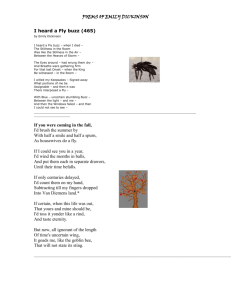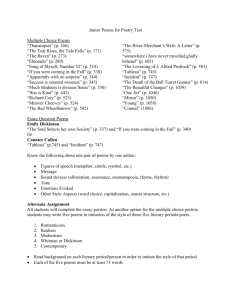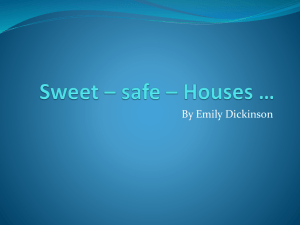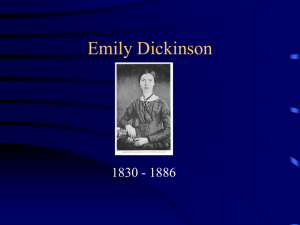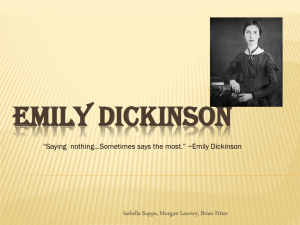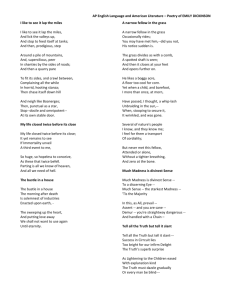Emily Dickinson's Poetry: Themes, Style, and Influences
advertisement
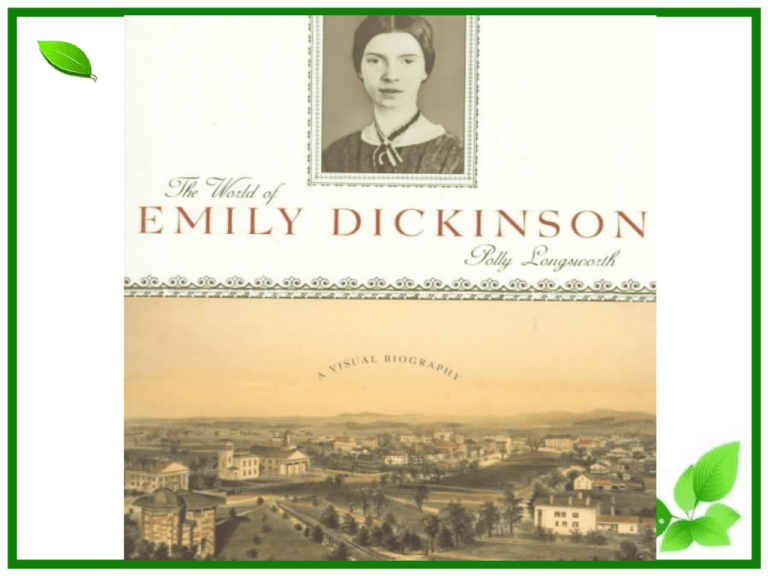
Sunrise in Amherst The Features of Emily Dickinson’s poetry Speaker:吴倩 Here’s a short list of indicating frequency of Emily Dickinson’s used favorite words in her 1775 poems: 170: 141: 130: 125: 124: 121: sun death, face god, time soul heart night 106: 102: 94: 88: 86: 82: 77: love bird die eyes bee, home light sky Other Subjects Death and Immortality Nature Subject matters Love Religion Success and Failure Unity of Goodness, Truth and Beauty •Death and immortality are the center of Dickinson’s poems (one third). •She expects to understand the meaning of life by understanding the meaning of death. •“I Heard a Fly buzz— when I died—” •“Because I could not stop for Death” •“My life closed twice before its close” I heard a Fly buzz– when I died— I willed my Keepsakes—Signed away The Stillness in the Room What portion of me be Was like the Stillness in the Air— Assignable—and then it was Between the Heaves of Storm— There interposed a Fly— The Eyes around– had wrung them dry— With Blue—uncertain stumbling Buzz— And breaths were gathering firm Between the light—and me— For that last Onset—when the King And then the Windows failed—and then Be witnessed—in the Room— I could not see to see— She was skeptical and ambivalent about the possibility of achieving immortality. Dickinson’s many friends died before her, and the fact that death seemed to occur often in the Amherst of the time added to her gloomy meditation. “My life closed twice before its close” portrays the poet as ever-ready for the assault of death. My life closed twice before its close; It yet remains to see If immortality unveil A third event to me, So huge, so hopeless to conceive As these that twice fell. Parting is all we know of heaven, And all we need of hell. Nature • Natural phenomena, changes of seasons, heavenly bodies, animals, birds and insects, flowers of various kinds—all these and many other subjects related to nature find their way into her poetry. • The mixed feelings of joy and grief at the coming of spring and autumn, the sense of momentary transitoriness(短暂,瞬间) and the power and majesty of summer storm. • In the meantime the cold indifference of nature is also revealed in her poems. Dickinson was original. The way she wrote about love is a good case in point. “Mine—by the Right of the White Election” expresses a passionate and eternal love in an elegiac (悲伤的)tone. “Wild Nights—Wild Nights”, Love is expressed in an unabashed manner with evident erotic image. Charles Wadsworth •Dickinson holds that beauty, truth and goodness are ultimately one. •John Keats— “beauty is truth, truth beauty-that is all Ye know on earth and all ye need to know.” •“I died for Beauty—but was scarce” •Strong influence of Calvinism on her thought (pessimism and tragic tone of her poems); •exploring human’s inner world (psychology description in her poems); •Her poems abounds in telling original images; •Good at catching the charm of something but dropping the thing itself; •Severe economy of expression; •Brief, direct and plain language Here are two versions of one stanza of one of her poems. The first is unedited; the second has been “corrected.” We passed the School, where Children strove At Recess—in the Ring— We passed the Fields of Gazing Grain— We passed the Setting Sun— We passed the school where children played Their lessons scarcely done; We passed the fields of gazing grain, We passed the setting sun. Characteristics of Poetic Forms • • • • • Overuse of capitalization & dashes(破折号); The use of deletions; Absence of connective words; Irregular rhymes; Wrenched grammar & syntax; e.g. "A Wonderful—to Feel the Sun." Rhetorical Devices Oxymoron (矛盾修饰法) Synesthesia (联觉) Alliteration(头韵),vowel rhyme(叠韵) Metaphor Death is a Dialogue between Personification The Spirit and the Dust. “Dissolve” says Death—The Spirit “Sir I have another Trust”— Capitalization of Her Poems • German, a language Dickinson knew, typically capitalizes nouns. • Capitalized words gives additional emphasis. • Some critics (Habegger) believe that her use is at times idiosyncratic and more random than meaningful, since in some instances a word is capitalized in one of Dickinson's handwritten copies of a poem but not in another of her copies. The Use of Dashes •marks to guide readers on how the passage should be read or phrased; •To makes readers ponder words and phrases; •To cause reflection and intensity; •To slow reader or call attention. I Like to See It Lap the Miles I like to see it lap the Miles— To fit it’s sides And lick the Valleys up— And crawl between And stop to feed itself at tanks— Complainig all the while And then—prodigious step In horrid—hooting stanza— Then—chase itself down Hill— Around a Pile of Mountains— And neigh like Boanerges— And supercilious peer Then—prompter than a Star In Shanties—by the sides of Roads— Stop—docile and omnipotent And then a Quarry pare At it’s own stable door— She tells about the railway is as impressive as her striking image of a galloping horse intended as a symbol both of the railroad and developing America.
